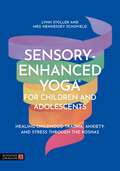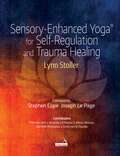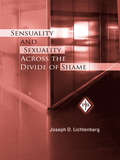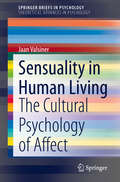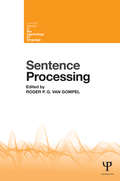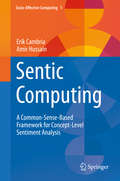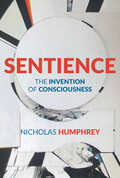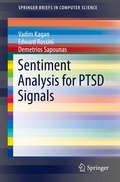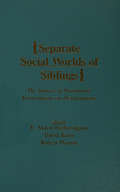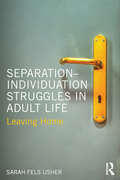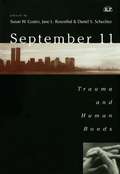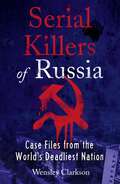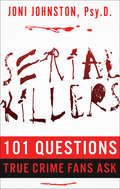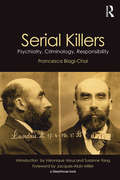- Table View
- List View
Sensory-Enhanced Yoga® for Children and Adolescents: Healing Childhood Trauma, Anxiety, and Stress Through the Koshas
by Lynn Stoller Meg Hennessey SchofieldThis evidence-based and trauma-informed resource allows professionals working with children and teens to apply sensory yoga as a holistic and effective tool in addressing symptoms of trauma, toxic stress, anxiety, depression, and related mental health conditions.Based on the Sensory and Mindfulness-based Yoga for Learning Environments (SMYLE™) model, this training program can easily be adopted by a wide range of professionals and applied to various settings, including schools, yoga classes, community centres, and group homes.In reducing stress, emotional dysregulation, and symptoms of hypervigilance and trauma, children and teens are able to benefit from a maintained state of calm and focus, and a heightened sense of self-worth and empowerment allowing for the long-term development of consistent healthy habits and routines.
Sensory-Enhanced Yoga® for Self-regulation and Trauma Healing
by Lynn StollerLynn Stoller, OT, MS, OTR, C-IAYT, RYT500, E-RYT200 and outstanding expert contributors skilfully synthesize theoretical concepts and research findings from the fields of occupational therapy, trauma psychology, neuroscience, and traditional Eastern yogic philosophy to produce a Transdisciplinary Model for Post-Traumatic Growth for healing symptoms of combat stress, PTSD, or other unresolved trauma or anxiety disorders. The model is informed by the highly successful yoga treatment protocol used with U.S. military personnel deployed to Kirkuk, Iraq, which the author co-developed (Stoller et al, 2012) and by her experiences teaching yoga to veterans in her local community. Sensory-Enhanced Yoga (R) is designed to help meet the following goals:Decrease hypervigilance and overreaction to sensory input (e.g.visual, crowds, touch, noise, movement).Improve quality of sleep and energy level to support wellness and enhance daily productivity.Decrease intrusive thoughts by learning to become present through breath and body awareness.Enhance one's sense of self-worth and personal empowerment.Whether you are a therapist looking for effective treatment tools for your clients or are seeking healing for yourself, this insightful book will provide you with effective strategies to help promote peace of mind and full engagement in life. Lynn's website: www.sensoryenhancedyoga.org
Sensual Rejuvenation: Maintaining Sexual Vigor Through Midlife and Beyond
by Judith SachsDid you know that sex can dramatically boost your overall well-being? If you, like many people, are hitting midlife and feeling that sex is just not what it used to be, think again. While you are experiencing a variety of physical and emotional changes, sex can still be one of the enduring pleasures you can enjoy through midlife and on to your golden years. Now this unique guide provides important information on age-related changes in sexual function and offers a wide range of medical, holistic, and psychological tips and techniques that can relight your fire. Don't miss... Testosterone cream that restores a woman's libido; Zinc, the most important mineral for male potency, and all the must-have nutrients; The best herbal alternatives to Viagra; Ways to fulfill sexual needs if there is illness or disability; The Seesaw and other stimulating exercises to make sex feel great. Find out more in Sensual Rejuvenation.
Sensuality and Sexuality Across the Divide of Shame (Psychoanalytic Inquiry Book Series #25)
by Joseph LichtenbergPlaced in a historical context, sexuality was once so prominent in psychoanalytic writing that sexual drive and psychoanalysis were synonymous. The exciting discovery of childhood sexuality filled the literature. Then other discoveries came to the fore until sexuality slipped far in the background. This book evokes the excitement of the original discoveries of childhood sexual experience while linking childhood sensuality and sexuality to adult attachment, romantic, and lustful love. This revised perspective offers the general reader insight into contemporary psychoanalytic thought, and presents clinicians with a perspective for exploring their patients sensuality and sexuality with renewed interest and knowledge.
Sensuality in Human Living: The Cultural Psychology of Affect (SpringerBriefs in Psychology)
by Jaan ValsinerThis book is a theoretical account for general psychology of how human beings meaningfully relate with their bodies-- from the basic physiological processes upwards to the highest psychological functions of religiosity, ethical reasoning, and devotional practices. It unites art and science into a new theory of affective synthesis that human minds are constantly involved in their everyday life worlds. Provides a new theory of aesthetic synthesis;Demonstrates the links between art and science;Provides a new understanding of the role of affect in human cognition.
Sent Before My Time: A Child Psychotherapist's View of Life on a Neonatal Intensive Care Unit (Tavistock Clinic Series)
by Margaret CohenSent Before My Time is an exploration of the workings of a neo natal intensive care unit from a child psychotherapist's point of view. It examines the relationships between the babies, the parents and the staff.
Sentence Processing: Sentence Processing (Current Issues in the Psychology of Language)
by Roger P. G. van GompelWhat are the psychological processes involved in comprehending sentences? How do we process the structure of sentences and how do we understand their meaning? Do children, bilinguals and people with language impairments process sentences in the same way as healthy monolingual adults? These are just some of the many questions that sentence processing researchers have tried to answer by conducting ever more sophisticated experiments, making this one of the most productive and exciting areas in experimental language research in recent years. This book is the first to provide a comprehensive, state-of-the-art overview of this important field. It contains 10 chapters written by world-leading experts, which discuss influential theories of sentence processing and important experimental evidence, with a focus on recent developments in the area. The chapters also analyse research that has investigated how people process the structure and meaning of sentences, and how sentences are understood within their context. This comprehensive and authoritative work will appeal to students and researchers in the field of sentence processing, as well anyone with an interest in psychology and linguistics.
Sentic Computing
by Amir Hussain Erik CambriaIn this book common sense computing techniques are further developed and applied to bridge the semantic gap between word-level natural language data and the concept-level opinions conveyed by these. In particular, the ensemble application of graph mining and multi-dimensionality reduction techniques is exploited on two common sense knowledge bases to develop a novel intelligent engine for open-domain opinion mining and sentiment analysis. The proposed approach, termed sentic computing, performs a clause-level semantic analysis of text, which allows the inference of both the conceptual and emotional information associated with natural language opinions and, hence, a more efficient passage from (unstructured) textual information to (structured) machine-processable data.
Sentience: The Invention of Consciousness
by Nicholas HumphreyThe story of a quest to uncover the evolutionary history of consciousness from one of the world's leading theoretical psychologists.We feel, therefore we are. Conscious sensations ground our sense of self. They are crucial to our idea of ourselves as psychic beings: present, existent, and mattering. But is it only humans who feel this way? Do other animals? Will future machines? Weaving together intellectual adventure and cutting-edge science, Nicholas Humphrey describes in Sentience his quest for answers: from his discovery of blindsight in monkeys and his pioneering work on social intelligence to breakthroughs in the philosophy of mind.The goal is to solve the hard problem: to explain the wondrous, eerie fact of &“phenomenal consciousness&”—the redness of a poppy, the sweetness of honey, the pain of a bee sting. What does this magical dimension of experience amount to? What is it for? And why has it evolved? Humphrey presents here his new solution. He proposes that phenomenal consciousness, far from being primitive, is a relatively late and sophisticated evolutionary development. The implications for the existence of sentience in nonhuman animals are startling and provocative.
Sentiment Analysis
by Bing LiuSentiment analysis and opinion mining is the field of study that analyzes people's opinions, sentiments, evaluations, attitudes, and emotions from written language. It is one of the most active research areas in natural language processing and is also widely studied in data mining, Web mining, and text mining. In fact, this research has spread outside of computer science to the management sciences and social sciences due to its importance to business and society as a whole. The growing importance of sentiment analysis coincides with the growth of social media such as reviews, forum discussions, blogs, micro-blogs, Twitter, and social networks. For the first time in human history, we now have a huge volume of opinionated data recorded in digital form for analysis. Sentiment analysis systems are being applied in almost every business and social domain because opinions are central to almost all human activities and are key influencers of our behaviors. Our beliefs and perceptions of reality, and the choices we make, are largely conditioned on how others see and evaluate the world. For this reason, when we need to make a decision we often seek out the opinions of others. This is true not only for individuals but also for organizations. This book is a comprehensive introductory and survey text. It covers all important topics and the latest developments in the field with over 400 references. It is suitable for students, researchers and practitioners who are interested in social media analysis in general and sentiment analysis in particular. Lecturers can readily use it in class for courses on natural language processing, social media analysis, text mining, and data mining. Lecture slides are also available online. Table of Contents: Preface / Sentiment Analysis: A Fascinating Problem / The Problem of Sentiment Analysis / Document Sentiment Classification / Sentence Subjectivity and Sentiment Classification / Aspect-Based Sentiment Analysis / Sentiment Lexicon Generation / Opinion Summarization / Analysis of Comparative Opinions / Opinion Search and Retrieval / Opinion Spam Detection / Quality of Reviews / Concluding Remarks / Bibliography / Author Biography
Sentiment Analysis for PTSD Signals
by Vadim Kagan Edward Rossini Demetrios SapounasThis book describes a computational framework for real-time detection of psychological signals related to Post-Traumatic Stress Disorder (PTSD) in online text-based posts, including blogs and web forums. Further, it explores how emerging computational techniques such as sentiment mining can be used in real-time to identify posts that contain PTSD-related signals, flag those posts, and bring them to the attention of psychologists, thus providing an automated flag and referral capability. The use of sentiment extraction technologies allows automatic in-depth analysis of opinions and emotions expressed by individuals in their online posts. By training these automated systems with input from academic and clinical experts, the systems can be refined so that the accuracy of their detection of possible PTSD signals is comparable to that of psychologists reading the same online posts. While a portion of the literature on this and related topics explores the correlation between text patterns in archived documents and PTSD, no literature to date describes a system performing real-time analysis. Our system allows analysts to quickly identify, review, and validate online posts which have been flagged as exhibiting signs or symptoms of PTSD and enables follow-up, thus allowing for the presentation of treatment options to the authors of those posts. We describe the ontology of PTSD-related terms (i. e. , terms which signal PTSD and related conditions) that need to be tracked, the algorithms used for extraction of the intensity of these signals, and the training process used to fine-tune sentiment analysis algorithms. We then present the results of processing a validation data set, different from the training set, comparing the algorithmic output with opinions of clinical psychologists, and explain how the concept can be extended to detect signals of other psychological conditions. We present a sample system architecture and implementation which can be used to engage users and their families, either anonymously or eponymously, and use the sentiment extraction algorithms as an early screening tool to alert clinicians to participants who may require close monitoring or follow-up. Finally, we describe a user test conducted with users recruited from the Veteran population and present the results of the analyses on the data.
Separación y divorcio: Cómo no afectar a tus hijos
by Juan Pablo ArredondoSiempre es complicado hablarles de divorcio a nuestros hijos. Si pudiéramos abordar otro tema, evitar el momento de decirlo, lo haríamos. Pero no hay marcha atrás. Cuando la pareja ha tomado la determinación, lo mejor es enfrentarlo. Y viene la cascada de temores, las inquietudes, la ambivalencia: tener que hablar con la verdad, decirles que mamá vivirá en una casa y papá en otra, que la vida tomará otro camino y que seguirán siendo nuestros amados hijos. ¡¡Puff!! Una situación nada sencilla para cualquiera de los dos conjugues. Con un tema tan complejo como es el divorcio, la experiencia de Juan Pablo Arredondo nos guía con cautela, pero al mismo tiempo con pasos firmes por el sendero que irremediablemente deben de cruzar los padres y madres divorciados –o en proceso de separación.
Separate Rooms: With an introduction by André Aciman, bestselling author of Call Me by Your Name
by Pier Vittorio TondelliWITH A NEW INTRODUCTION BY ANDRÉ ACIMAN, AUTHOR OF CALL ME BY YOUR NAME'A classic of Italian gay fiction . . . the whole thing is bathed in elegiac pathos'THE SUNDAY TIMES'An Italian novel of imperfect love and urgent grief'NEW YORK TIMES'Beautiful and poignant'THE TIMES'A stunning novel . . . prepare to be deeply moved'JACK PARLETT, author of Fire IslandThomas, a young German musician, is dying. His older boyfriend, a renowned Italian writer named Leo, finds it impossible to watch the slow and inevitable demise of his lover; he condemns himself to moving cities every few weeks instead, in the hope of finding a semblance of peace.He travels through Europe where past and present overlap, years merge and faces emerge - and where reminders of the life he and Thomas shared are on every corner. Leo's memories become clearer with every road he takes, much as he wishes he could simply forget. Wanting to preserve the passion of their relationship, Leo had forced Thomas to live separately: in separate rooms, separate towns, with separate lives. But now, face to face with true solitude, Leo must finally reckon with the impossible striving of memory to recreate life and, ultimately, cross an ocean to find the strength to go on.
Separate Rooms: With an introduction by André Aciman, bestselling author of Call Me by Your Name
by Pier Vittorio Tondelli'Is this overlooked Italian novel the new Call Me by Your Name? A classic of Italian gay fiction . . . the whole thing is bathed in elegiac pathos'THE SUNDAY TIMES'An Italian novel of imperfect love and urgent grief'NEW YORK TIMES'Beautiful and poignant'THE TIMES'A stunning novel . . . prepare to be deeply moved'JACK PARLETT, author of Fire Island'A discreet, lyrical meditation on the nature of male love'EDMUND WHITEWith an introduction by André Aciman, bestselling author of Call Me by Your NameThomas, a young German musician, is dying. His older boyfriend, a renowned Italian writer named Leo, finds it impossible to watch the slow and inevitable demise of his lover; he condemns himself to moving cities every few weeks instead, in the hope of finding a semblance of peace.He travels through Europe where past and present overlap, years merge and faces emerge - and where reminders of the life he and Thomas shared are on every corner. Leo's memories become clearer with every road he takes, much as he wishes he could simply forget. Wanting to preserve the passion of their relationship, Leo had forced Thomas to live separately: in separate rooms, separate towns, with separate lives. But now, face to face with true solitude, Leo must finally reckon with the impossible striving of memory to recreate life and, ultimately, cross an ocean to find the strength to go on.André Aciman's Call Me by Your Name meets Ocean Vuong's On Earth We're Briefly Gorgeous: Separate Rooms is a singular and unforgettable meditation on almost-ideal love, told in three musical movements, by a fiery and unforgettable literary talent.
Separate Social Worlds of Siblings: The Impact of Nonshared Environment on Development
by Robert Plomin David Reiss E. Mavis HetheringtonOne of the most notable findings in contemporary behavior genetics is that children growing up in the same family are not very comparable. Findings suggest that in order to understand individual differences between siblings it is necessary to examine not only the shared experiences but also the differences in experiences of children growing up in the same family. In the past decade a group of investigators has begun to examine the contributions of genetics, and both shared and nonshared environment to development. As with many new research endeavors, this has proven to be a difficult task with much controversy and disagreement not only about the most appropriate models and methods of analysis to be used, but also about the interpretation of findings. Written by some of the foremost scholars working in the area on nonshared environment, the papers in this book present their perspectives, concerns, strategies and research findings dealing with the impact of nonshared environment on individual differences in the development of siblings. This volume will have heuristic value in stimulating researchers to think in new ways about the interactions between heredity, shared and nonshared environment and the challenges in identifying their contributions to sibling differences. These papers should raise new questions about how to examine the contributions of genetic and environmental factors to development, with consideration given to the findings of this study of sibling differences and nonshared environment. Further, these papers may encourage a growing trend to integrate genetic and environmental perspectives in studies of development.
Separation Anxiety in Adulthood: How to Address it in Clinical Practice
by Barbara Milrod Stefano PiniThis book presents data that challenges the long-established view that separation anxiety disorder should be reserved for diagnosis among children and adolescents by demonstrating that adult-onset is prevalent in many countries and that adult-onset separation anxiety disorder is just as persistent and impairing as the pediatric-onset form. Separation anxiety disorder in adulthood is associated with high levels of disability. Research and clinical data indicate that overlooking the diagnosis of adult separation anxiety disorder may result in substantial costs in the form of disability and suffering.Over the last decades, the Psychiatry School of Pisa, in the person of Director Giovanni B. Cassano, M.D. and Stefano Pini, M.D. has conducted seminal studies in this area and brought research data into clinical practice. At the same time, the Pisa School has made a paramount contribution to the DSM-5 reformulation of adult separation anxiety disorder, which has since been transferred to the Anxiety Disorders chapter. Barbara Milrod, M.D. is an unusual clinical investigator. She has conducted clinical research in separation anxiety disorder, panic disorder and post-traumatic stress disorder for the past two decades. She has incorporated separation anxiety constructs into her approach to mechanisms of psychotherapy research across these disorders, and in affect-focused psychotherapies.The book consists of 10 chapters organized into two sections: a General Principles Section and Diagnosis and Treatment Section. The first section focuses on the biological underpinnings of separation anxiety and on the historical pathways that led to its DSM-5 categorization; the second elaborates on clinical topics, preventive strategies and treatments. This book will help the reader to understand and diagnose separation anxiety disorder and to bear it in mind during the differential diagnosis of patients of all ages presenting not only with anxiety but also with a variety of psychiatric and behavioral disorders.
Separation-Individuation Struggles in Adult Life: Leaving Home
by Sarah Fels UsherSeparation-Individuation Struggles in Adult life: Leaving Home focuses on the developmental task of separating from parents and siblings for individuals and couples who have not been able to resolve these issues earlier in life. Sarah Fels Usher extends Mahler’s theory, and includes the writing of Loewald and Modell, among others, stressing the right of adult patients to a separate life. She describes the predicament of Oedipal victors (or victims), their introjected feelings of responsibility for their parents, and their resultant inability to be truly individuated adults. Difficulties separating from siblings are also given analytic attention. Usher’s experience treating couples adds a new and powerful dimension to her theory. She is optimistic throughout about the therapist’s ability to help adult patients resolve the rapprochement sub-phase in a satisfying manner. An additional, crucial question is raised when the author asks if the therapist can allow the patient to terminate treatment. Has the therapist achieved separation from their own parents—or, indeed, from their analyst? Exploring the plight of patients of the unseparated analyst, Usher describes how these generational factors rear their unfortunate heads when it is time to end therapy. Listening to patients from the perspective of separation-individuation is not new; what is new is Usher’s emphasis on how these particular issues are often masked by significant achievement in adult professional life. Separation-Individuation Struggles in Adult Life: Leaving Home will be of great importance for psychoanalysts and psychoanalytic psychotherapists working with adults, as well as for clinical postgraduate students.
September 11: Trauma and Human Bonds (Relational Perspectives Book Series)
by Daniel S. Schechter Susan W. Coates Jane L. RosenthalDrawing on research from a variety of domains - clinical studies of trauma, developmental psychopathology, interpersonal psychobiology, epidemiology, and social policy - September 11: Trauma and Human Bonds addresses especially the fundamental relationship of human bonds to trauma and underscores the manner in which developments in all these fields are coming together in complementary ways that sustain a key finding: that trauma must be understood in its relational and attachment contexts. The quality of early emotional attachments, differences in attachment styles to family milieus, and the psychological qualities that enable traumatized parents to avoid traumatizing their children are among the topics through which these contexts are explored. From their various disciplinary vantage points, the contributions converge to show how human relationships can either provide an anodyne to trauma or serve as the vehicle of its transmission. As Susan Coates observes, a major legacy of 9/11 is the realization that "there are no simple truths in the world of trauma studies, no easy-to-remember anodynes or pharmacologic magic bullets or depth-psychological schematizations that will hold true for a majority or even a sizable minority of cases." Yet, in delineating the multiple connections between human relations and trauma, and in elaborating these connections from multiple disciplinary perspectives, the contributors to September 11 have taken a decisive first step to consolidate new knowledge about trauma and to demonstrate how it can assist clinicians who encounter diverse responses to trauma in their day-to-day work. A sobering reminder of shared human vulnerability in the face of devastating events, September 11 is also a heartening reminder of resiliency in the face of overwhelming loss and of the healing potential of human connection.
Sequential Analysis and Observational Methods for the Behavioral Sciences
by Vicenç Quera Roger BakemanBehavioral scientists - including those in psychology, infant and child development, education, animal behavior, marketing and usability studies - use many methods to measure behavior. Systematic observation is used to study relatively natural, spontaneous behavior as it unfolds sequentially in time. This book emphasizes digital means to record and code such behavior; while observational methods do not require them, they work better with them. Key topics include devising coding schemes, training observers and assessing reliability, as well as recording, representing and analyzing observational data. In clear and straightforward language, this book provides a thorough grounding in observational methods along with considerable practical advice. It describes standard conventions for sequential data and details how to perform sequential analysis with a computer program developed by the authors. The book is rich with examples of coding schemes and different approaches to sequential analysis, including both statistical and graphical means.
Serenity: The Blood Moon Prince: A Novel
by Kya WolfEighteen-year-old post war survivor, Kain Raingel is haunted by his hidden magical past while trying to heal from his trauma; and he must find the courage to face his past or risk losing everything he holds dear to save the one he loves.
Serial Killers of Russia: Case Files from the World's Deadliest Nation
by Wensley ClarksonFor fans of Christopher Berry-Dee's Talking with Serial Killers series, this chilling new book explores the dark heart of Russia. For decades, it has been assumed that the United States of America was the serial killer capital of the world.Now, criminologists believe that Russia (and previously the Soviet Union) has been, secretly, the biggest home of serial killers for almost a century.In Serial Killers of Russia, bestselling true crime author Wensley Clarkson reveals the inside stories and gruesome details behind the country's most notorious and previously unknown murderers. Using information from a vast range of new and archive sources, Clarkson tells stories of the dangerous, the devious and the truly shocking, and tackles why the nation has become a breeding ground for humanity's most evil.These are the most horrifying cases from the darkest corners of Russia.
Serial Killers of Russia: Case Files from the World's Deadliest Nation
by Wensley ClarksonFor fans of Christopher Berry-Dee's Talking with Serial Killers series, this chilling new book explores the dark heart of Russia. For decades, it has been assumed that the United States of America was the serial killer capital of the world.Now, criminologists believe that Russia (and previously the Soviet Union) has been, secretly, the biggest home of serial killers for almost a century.In Serial Killers of Russia, bestselling true crime author Wensley Clarkson reveals the inside stories and gruesome details behind the country's most notorious and previously unknown murderers. Using information from a vast range of new and archive sources, Clarkson tells stories of the dangerous, the devious and the truly shocking, and tackles why the nation has become a breeding ground for humanity's most evil.These are the most horrifying cases from the darkest corners of Russia.
Serial Killers: 101 Questions True Crime Fans Ask
by Joni JohnstonA forensic psychologist answers true crime fan questions and reveals the terrifying truth behind the world’s deadliest serial killers.Serial killers haunt our dreams and inspire the terrifying villains of TV shows and horror movies. But how much do you really know about the minds behind the world’s deadliest killers? What drives these murderers to kill and kill again? And what fuels our fascination with the true stories of their horrific crimes?Now forensic psychologist, private investigator, and crime writer Dr. Joni E. Johnston brings you the answers to these questions and more! Serial Killers: 101 Questions True Crime Fans Ask dives into the case files of the most infamous murderers in history, and answers the questions true crime fans have been dying to ask . . .
Serial Killers: Psychiatry, Criminology, Responsibility
by Francesca Biagi-ChaiFrancesca Biagi-Chai’s book - a translation from the French of Le Cas Landru - tackles the issue of criminal responsibility in the case of serial killers, and other 'mad' people who are nonetheless deemed to be answerable before the law. The author, a Lacanian psychoanalyst and senior psychiatrist in France, with extensive experience working in institutional settings, analyses the logic informing the crimes of famous serial killers. Addressing the Landru case (which was the inspiration for Chaplin's Monsieur Verdoux), as well as those of Pierre Rivière and Donato Bilancia, Biagi-Chai casts light on the confusion that pervades forensic psychiatry and criminal law as to the distinction between mental illness and ‘madness’. She then elaborates the consequences of her argument in a sustained critique of the insanity defence. The book includes a Foreword by the renowned psychoanalyst, Jacques-Alain Miller, and an introduction by the translators on the question of insanity before the law in the US and in the UK, which considers the pertinence of Biagi-Chai’s argument for forensic psychiatry, for criminal law, and for the increasing contemporary focus on the assessment of dangerousness and risk-management strategies in crime control practices.
Serial Killers: Shocking, Gripping True Crime Stories Of The Most Evil Murderers
by Brian InnesThe Terrifying Story of the Most Monstrous Serial Killers through History.Serial Killers are the most notorious and disturbing of all criminals, representing the very darkest side of humanity. Yet they endlessy fascinate and continue to capture the public's attention with their strange charisma and deadly deeds. From Jack the Ripper to Ted Bundy and the Moors Murderers Ian Brady and Myra Hindley, these killers transfix us with their ability to commit utterly savage acts of cruelty and depravity. Only with modern police detection methods and psychological profiling, have these figures that have existed throughout human history finally been identified in the deadliest category: serial killers. These methods, the killers' characters and their crimes are described here in fascinating and terrifyingly gripping detail. The whole history of serial killers is brought to life in 50 chapters, including:Herman Webster Mudget, Devil in the White CityJohn Christie, 10 Rillington Place murdersZodiac KillerIan Brady and Myra Hindley, The Moors MurderersTed BundyFred and Rosemary WestJeffrey DahmerAileen WuornosHarold Shipman, Dr Death
